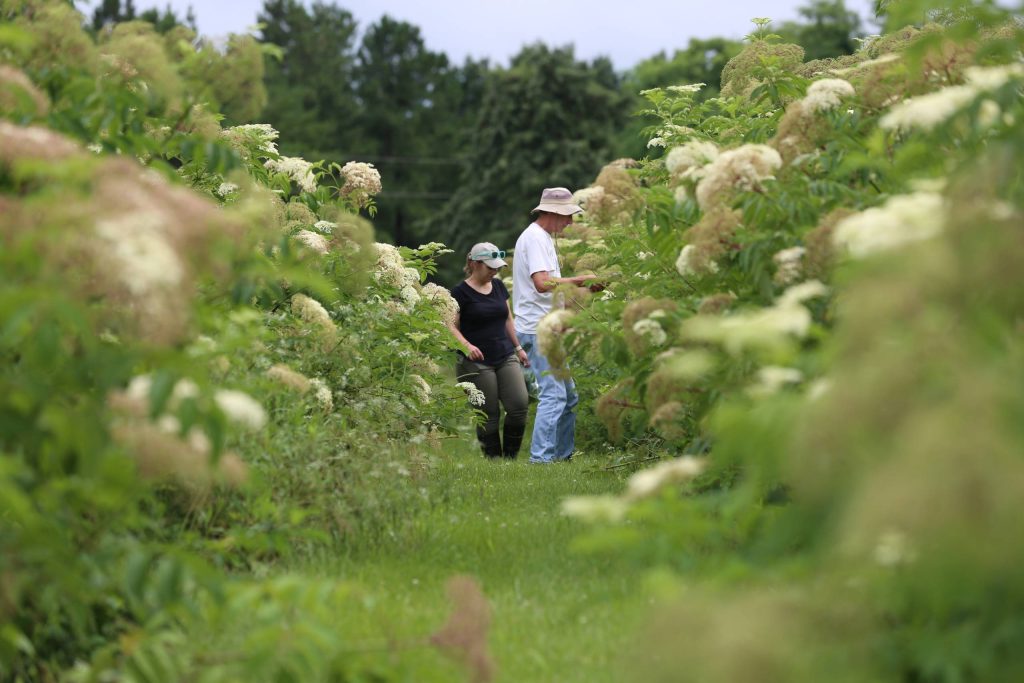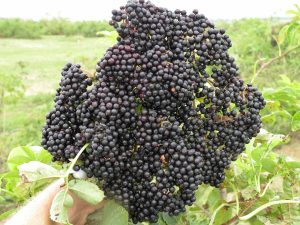
Andrew Thomas has big plans for a small berry. Thomas, research assistant professor in the Division of Plant Science and Technology in the College of Agriculture, Food and Natural Resources at the University of Missouri, has received a Specialty Crop Research Initiative (SCRI) grant from the U.S. Department of Agriculture for the project Moving American Elderberry into Mainstream Production and Processing. The award is for $5,345,255 over a four-year period.
Elderberry is a native plant found all over the Midwest and eastern United States. Thomas, who has conducted elderberry research for 24 years at CAFNR’s Southwest Research, Extension and Education Center (SW-REEC) at Mount Vernon, Missouri, has found that the demand for elderberry products has increased over the last several years.
“The industry has really continued to grow, especially during Covid-19,” said Thomas. “Elderberry-based dietary supplement product sales have skyrocketed because of their well-known health benefits. Elderberry is full of antioxidants that can help boost your immune system.”

“Elderberry production in Missouri has also started to boom,” added Thomas. “It has become the number one berry crop in Missouri, now surpassing blackberries and strawberries combined.”
“Andy has dedicated a significant part of his career to elderberry research, and this grant is a well-deserved recognition for his accomplishments,” said Shibu Jose, associate dean for research in CAFNR. “This is a big steppingstone for further advancing elderberry as a specialty crop for Missouri and beyond, and an important collaboration across multiple disciplines, universities and centers. This project will showcase and build on the outstanding research that Andy and his colleagues have completed.”
Thomas said there are several moving parts to this project, including horticulture, plant breeding, food science, human health, mechanical harvest, economics and a strong outreach component. The foundation of the project is running a south-to-north trial, planting different varieties in different regions.
“I always get questions of: Will, for example, an Oklahoma variety grow well in Missouri or even in Canada?” said Thomas. “My answer has always been ‘I don’t know,’ but now we will have the resources to find out.”
Thomas and his team will plant different varieties in five different locations: at the Kerr Center for Sustainable Agriculture in Poteau, Oklahoma; the Savanna Institute in southwest Wisconsin and in Champaign, Illinois; the MU SW-REEC in Mount Vernon, Missouri; and the MU Horticulture and Agroforestry Research Center in New Franklin, Missouri. These sites will host field days and events to educate the public about elderberries and the industry.
Other aspects of this research include basic breeding of elderberry plants, which is being led by Ron Revord, assistant research professor at the MU Center for Agroforestry. Since elderberry production is relatively new and the plant is native, very little breeding has previously been done.
“Elderberry is not advanced at all in terms of cultivar development,” said Thomas. “We are jump-starting the project with a very basic, foundational breeding program, while concurrently using modern technologies to set the stage for much more sophisticated genetic advancements down the line.
“We expect to plant thousands of seedlings from our program at various locations,” he said. “Our goal is to identify and eventually release superior cultivars for elderberry growers in Missouri and elsewhere.”
Other parts of the project include working with Jianfeng Zhou, assistant professor in the Division of Plant Science and Technology, on mechanical harvest equipment. Economists at the University of Minnesota and MU will be studying production costs, as well as the current elderberry market and the market potential.
Another important part of the project is health and food science. Food scientists at MU including Kiruba Krishnaswamy, assistant professor in food science, and North Carolina State University are working together on understanding the processing of elderberries into juice and pomace. In their labs, they will develop methods to spray-dry juice to make a powdered “super food” that can be easily added to products such as protein shakes and bars.
Researchers in the MU School of Medicine will be studying elderberry’s potential benefit to the aging brain using mouse models. The food science group will be pre-preparing elderberry products that will go into the diets of mice. Researchers will be looking at dementia, memory loss and other aspects of the aging brain to determine if elderberry supplements can maintain and even improve brain health as people grow older.
The project involves collaborations with many researchers across numerous disciplines at MU, but also with institutions across the country. Additional collaborators include the University of Minnesota, Savanna Institute, Kerr Center, North Carolina State University and Lincoln University.
“I am so fortunate not only to have connections with a team of incredible researchers and Extension faculty at MU, but also to have terrific connections with experts at other institutions,” said Thomas. “Without them none of this would be possible.”